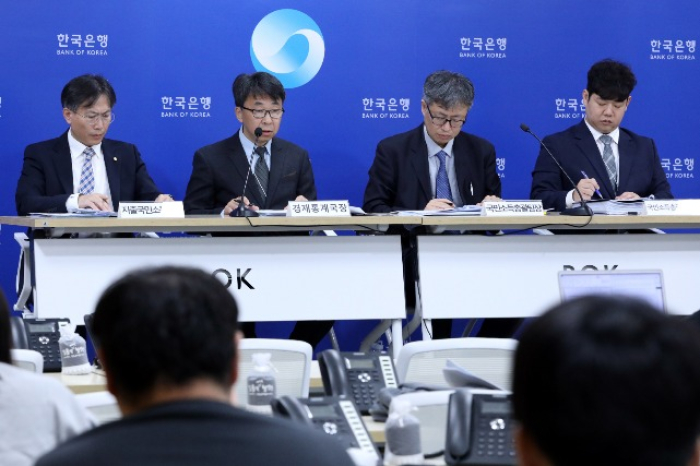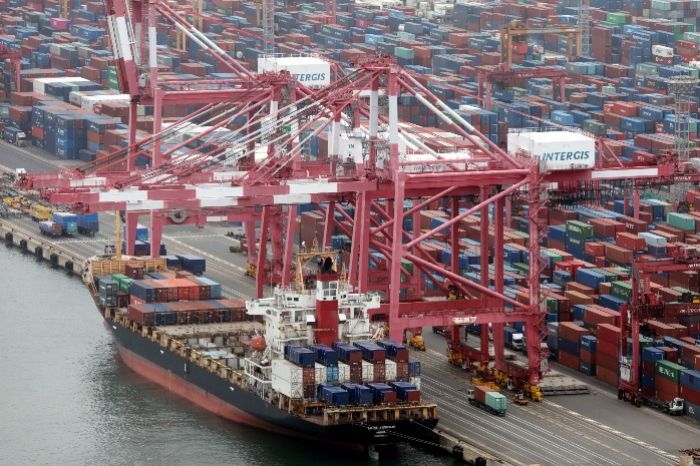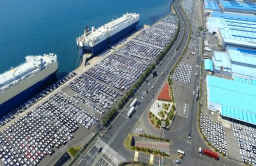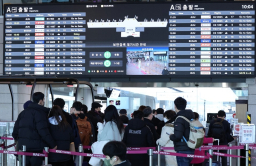-
KOSPI 2812.05 +41.21 +1.49%
-
KOSDAQ 756.23 +6.02 +0.80%
-
KOSPI200 376.54 +6.64 +1.80%
-
USD/KRW 1373 3.00 -0.22%
S.Korea’s Q3 GDP up 0.6% on-quarter on recovery in exports
Economy
S.Korea’s Q3 GDP up 0.6% on-quarter on recovery in exports
Yet it remains uncertain whether Asia’s fourth-largest economy will meet its central bank’s 1.4% growth forecast for this year
By
Oct 26, 2023 (Gmt+09:00)
3
Min read
News+

South Korea’s economy in the third quarter grew 0.6% from the previous quarter, extending a growth streak to three consecutive quarters on a recovery in exports. But uncertainty remains high due to lingering inflationary pressure coupled with growing external geopolitical risks.
Korea’s gross domestic product (GDP) expanded 0.6% in the July-September period from the prior three months on a seasonally adjusted basis, according to the Bank of Korea’s (BOK) advance estimates on Thursday.
It grew at the same pace as in the preceding quarter and maintained its growth trend for a third quarter in a row after dipping below zero in the fourth quarter of 2022 — the first economic contraction in two and a half years for Asia's fourth-largest economy.
But it remains uncertain whether the country’s economy will meet the central bank’s growth projection of 1.4% for this year due to still-high inflation and the Israel-Hamas war in the oil-rich Middle East, warned the Bank of Korea.
S.Korea’s economic growth trend
(Based on QoQ change in real GDP)
Source: Bank of Korea
“The economy would grow 1.4% this year if it expands 0.7% on-quarter in the fourth quarter,” Shin Seung-chul, director general of the BOK’s economic statistics division, said on Thursday, adding that economic uncertainty remains high due to the Israel-Hamas conflict and the US’s possibly higher-for-longer interest rates.
Considering the BOK’s forecast, the Korean economy is expected to post a moderate recovery, said Jung Kyu-chul, director of the Office of Macroeconomic Analysis and Forecasting at the Korea Development Institute.
On an annual basis, Korea’s GDP grew 1.4% in the third quarter after a 0.9% gain in the second quarter.
EXPORTS LEAD THE GROWTH
It was mainly exports that drove the country’s GDP growth in the third quarter.
According to central bank data, exports added 3.5% in the quarter thanks to a recovery in outbound shipments of microchips and machinery. Net exports contributed the most to the GDP growth, with a 0.4 percentage point.
The country's exports in the first 20 days of this month picked up compared with the same period last year despite fewer working days, heightening expectations that the country could snap its year-long losing streak in exports in October.
Citing the swift recovery in the country’s exports, led by a rebound in memory chip prices, Korea’s Ministry of Economy and Finance expects the country’s economy to grow by 0.7% so that annual growth would meet the 1.4% projection.

Private consumption added 0.3%, driven by a rise in spending on hospitality, leisure and culture services.
But inflation concerns are expected to continue to weigh on consumer sentiment for a while, Shin said, forecasting a moderate recovery.
Facility investment declined by 2.7% over the same period.
A RATE HIKE
Last week, Bank of Korea Governor Rhee Chang-yong said the country’s inflationary pressure would remain high longer than expected amid the growing global geopolitical uncertainties, leaving the door open to another rate hike this year.
Consumer prices rose 3.7% in September versus a year earlier, their fastest pace since April, according to government data.
Rhee said monetary policymakers agreed that the BOK needs to raise the rate over the next three months to control inflation, after the central bank kept the country’s policy interest rate at 3.50% for a sixth straight meeting.
The Bank of Korea maintained the country’s growth and inflation projections for this year at 1.4% and 3.5%, respectively, in August, but cut its growth forecast for 2024 to 2.2% from the previous 2.3% published in May, citing the sluggish recovery in China, Korea’s top trading partner.
Write to Kyung-Min Kang at kkm1026@hankyung.com
Sookyung Seo edited this article.
More To Read
-
Oct 23, 2023 (Gmt+09:00)
-
Oct 19, 2023 (Gmt+09:00)
-
Aug 24, 2023 (Gmt+09:00)
-
Apr 25, 2023 (Gmt+09:00)






